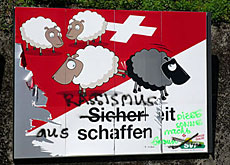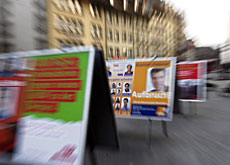Radicals lose ground as elections draw closer

The centre-right Radicals, currently the third-biggest party, are losing ground in the Swiss federal election campaign, a poll has indicated.
Support for the Green Party, which is hoping to become a significant new force in parliament, has declined slightly and fallen below the ten per cent mark.
If the elections were held today, the rightwing Swiss People’s Party would gain 26.2 per cent of the votes, and the centre-left Social Democratic Party 22.8 per cent, according to the sixth election barometer reading on Friday.
The gfs.berne institute carries out the poll on behalf of the Swiss Broadcasting Corporation – swissinfo’s parent company.
The pollsters say support for the two biggest parties seems to have stabilised.
The Green Party would have 9.5 per cent, back under the ten per cent barrier which they broke through earlier in the year, but still two percentage points up on their score in the 2003 elections.
In the race for third place, the Radicals have the support of 15.8 per cent of voters and the centre-right Christian Democrats 15.2 per cent.
Still ahead… but
Although the Radicals are still ahead, they have lost ground in comparison with the last poll a month ago.
The Christian Democrats have improved their position, managing to attract supporters of other parties as well as some first-time voters. Their new president, Christophe Darbellay, has succeeded in building up his image among the public.
The Radical Party, on the other hand, is losing support to the right, and has been criticised for the woolliness of its campaign.
In 2003 the Christian Democrats were three per cent behind their Radical rivals, a difference which cost them one of their two seats in the seven-member government, which is made up of representatives of the four largest parties.
If the Radicals continue to decline, it could be their turn to lose a cabinet member, especially if the Radical Pascal Couchepin, currently interior minister, steps down as predicted during the next legislature.
The seventh cabinet seat would then probably go back to the Christian Democrats. Previous polls have shown that only about a quarter of voters could imagine a Green minister, with most voters supporting the status quo.
Foreigners and climate
The poll shows that two issues remain at the forefront of concerns among Swiss voters: foreigners and integration on the one hand, and climate change and the environment on the other. Each was named by 28 per cent of those polled.
Other issues aroused much less interest. Only 11 per cent said they were worried about unemployment, for example, while nine per cent were concerned about refugees and asylum, and six per cent about the European Union.
The two major issues are associated with two particular parties.
Of those who named foreigners and integration as their top concern, 58 per cent believe that the People’s Party has the best solutions.
As for those who are chiefly worried about climate change, 68 per cent think the Greens are best placed to tackle the issue.
But the Greens have the problem of being seen as a single-issue party. Even among its own voters, it cannot be identified with any other major topic, the gfs.bern institute noted.
If the environment were to stop being a major concern for the Swiss, the impressive gains made by the Greens over the past few months could melt away… just like the Swiss glaciers that are subject to global warming.
swissinfo, based on an article in French by Olivier Pauchard
Main findings of the poll:
Swiss People’s Party: 26.2% (26.7% in 2003)
Social Democratic Party: 22.8% (23.3%)
Radical Party: 15.8% (17.3%)
Christian Democratic Party: 15.2% (14.4%)
The Green Party: 9.5% (7.4%)
Expected turnout: 49% (45.4%)
The poll, carried out by the gfs.berne institute on behalf of the Swiss Broadcasting Corporation – swissinfo’s parent company – is the sixth in a series of eight before the federal elections on October 21.
A total of 2,032 people from all the Swiss language regions were questioned between August 6 and 18 in the representative survey.
It covers only the views about the seats in the House of Representatives, the parliamentary chamber that represents the Swiss people.
The margin of error is 2.2%.

In compliance with the JTI standards
More: SWI swissinfo.ch certified by the Journalism Trust Initiative




You can find an overview of ongoing debates with our journalists here. Please join us!
If you want to start a conversation about a topic raised in this article or want to report factual errors, email us at english@swissinfo.ch.